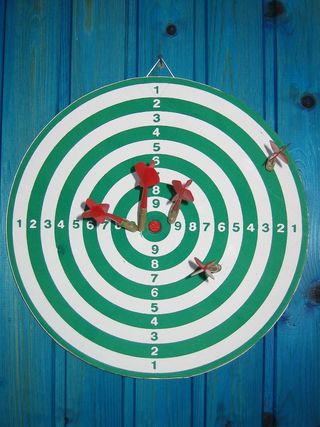Personality
When Personality Test Results Are Wrong, But Feel So Right
Two more reasons your results might seem accurate when they're not.
Posted September 29, 2019 Reviewed by Devon Frye
Welcome back, friends!
In this series, we're unpacking personality tests. I've shown you some reasons two popular personality type systems, the Myers-Briggs (MBTI) and Enneagram, are not actually good indicators of personality. I have also explored three reasons we're motivated to take personality tests and identify with their results; namely, we want to feel like we belong, we want to learn something we didn't know about ourselves, and we want easy ways to categorize people.
In this third post, I will discuss two reasons these tests can seem so accurate when they are not. The way they present our results and the way we process self-relevant information combine to create a convincing case. At the end of the post, you might even be able to spot a bad test in the wild!
1. The way we process results makes them feel really accurate.
Personality tests can seem very accurate even when they are not. Perhaps you’ve met someone who claims to be an Enneagram 3, and it really seems like that description fits them to a tee. One of the reasons for this illusion of accuracy has to do with confirmation bias: When we believe something is true, we automatically begin to filter information based on that assumption.

For example, when someone says that they are a 3, you will more easily notice and remember behavior that is consistent with a 3 and fail to notice or even actively explain away behavior that is not consistent with a 3. Thus, even if a person is behaving in many ways that are not like a 3 at all, you likely will only catch the behaviors that are. This difference in attention leads you to feel that their personality type is accurate—after all, you’ve seen a lot of evidence of it in their behavior!
Similarly, when we read the description of our own personality type from one of these tests, it often feels spot on, as if the people who created the test know us very well. This is due in part to how we process self-relevant information.
In 1949, Bertram Forer conducted an experiment in which he had participants take a personality test, and then gave them what they were told were their personalized results. However, he gave the same description to all of them. The description consisted of several general statements that could apply to almost anyone, such as “You have a great need for other people to like and admire you,” and “You have a tendency to be critical of yourself.” In what came to be known as the Forer Effect, a majority of the participants believed this generic feedback was very accurate.
Although it often feels very specific, much of the personality profiles associated with different MBTI and Enneagram types are quite general. For example, in the official description of the MBTI types, you will find many statements that could apply to just about anyone:
- “Like to have their own space and to work within their own time frame” (ISFP),
- “Want an external life that is congruent with their values” (INFP),
- “Enjoy material comforts and style” (ESTP), and
- “Want to be appreciated for who they are and for what they contribute” (ESFJ).
In the “key motives” for the Enneagram types, we again find statements that would describe many people, like “want to be right, to strive higher and improve everything, to be consistent with their ideals, to justify themselves, to be beyond criticism so as not to be condemned by anyone” (Type 1) and “want to have security, to feel supported by others, to have certitude and reassurance, to test the attitudes of others toward them, to fight against anxiety and insecurity” (Type 6). Similarly, “Ones” can be “moody and irrational” and “Sixes” become “competitive and arrogant” under stressful conditions, tendencies that most people would have under stress.
Why would we respond so strongly to a vague personality profile that could fit just about anyone? One reason is that we are told that these are our real results and are thus inclined to believe them. Self-verification theory suggests that we are motivated to make others see us as we see ourselves, so if we believe the personality profile we receive, we may begin to act in ways that are consistent with it so that others will see confirmation of it, too.
Another is that confirmation bias applies to thinking about our own personalities, too; when elements of our personality description don’t fit us well, we assign less weight to those elements and more to the ones that do fit, or that we want to fit. And a third reason has to do with the tone of the feedback itself.
2. Bad personality tests can make us sound better than we really are.
One reason we may think feedback on personality tests is accurate is that it tends to be mostly positive. Many do not include unflattering content at all, and the ones that do focus primarily on our praiseworthy qualities. Research has shown that in personality descriptions that contain both positive and negative attributes, we tend to rate the positive qualities as accurate and the negative ones as much less accurate, even when the negative qualities are things that are common.
Evidence of a tendency toward positive feedback shows up in the names of the Enneagram types: “The Reformer” (1), “The Helper” (2), “The Achiever” (3), “The Individualist” (4), “The Investigator” (5), “The Loyalist” (6), “The Enthusiast” (7), “The Challenger” (8), and “The Peacemaker” (9); all good things to be.
The MBTI types do not officially have names, although some sites have created more descriptive labels. During my extensive googling (or perhaps more accurately, asking Jeeves) about INTJs when I was in college, I found a description for INTJ called “The Mastermind.” Mastermind. Nice. I’ll take it!
To its credit, the Enneagram does admit that we can have some negative tendencies. However, if you read the content of the MBTI descriptions, it is all positive. This is not an exaggeration. They do not include any negative qualities.
This is one way we can be sure these types aren’t completely accurate—even the most admirable among us have faults. I like to joke that with these tests, nobody ever gets a type called “The Total Scumbag,” when we know that there are some people in the world who are, in fact, total scumbags.
Now what?
You might now be asking yourself whether there is any good way to measure your personality. The answer is yes! In the next post, I introduce a scientifically validated way of understanding personality and give you an opportunity to get some real, trustworthy feedback. And in the final post of the series, I explain why it does a better job than the MBTI and Enneagram.




